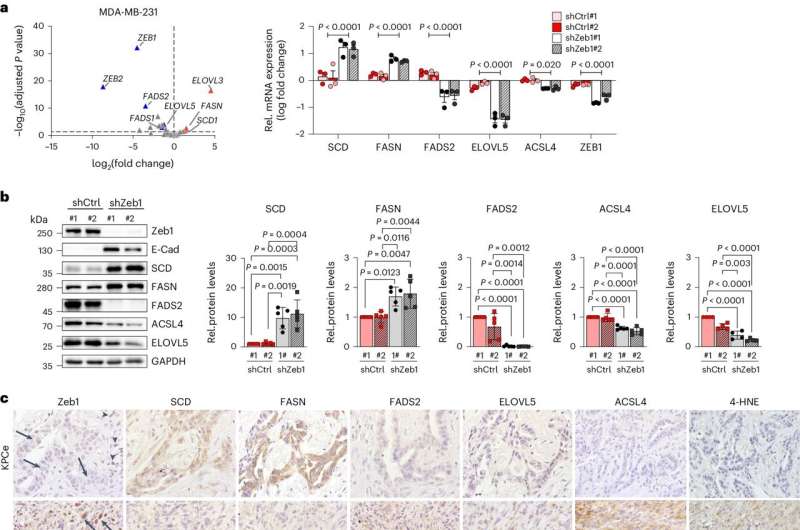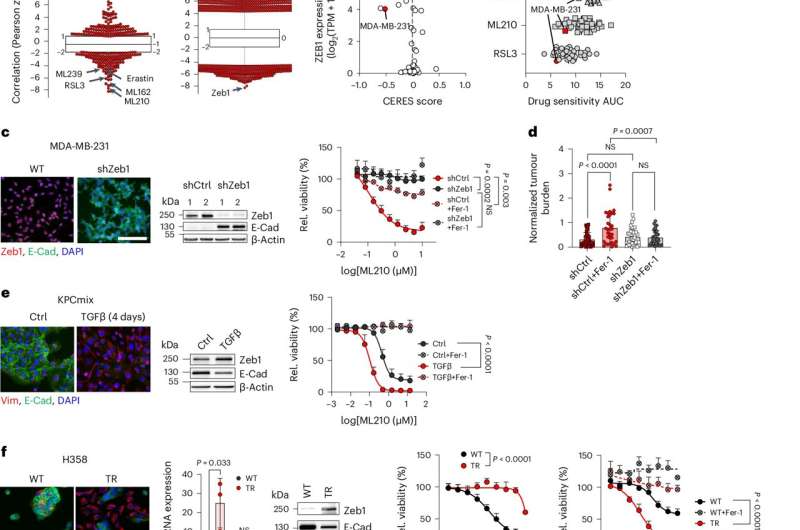This article has been reviewed according to Science X's editorial process and policies. Editors have highlighted the following attributes while ensuring the content's credibility:
fact-checked
peer-reviewed publication
trusted source
proofread
A treatment for metastasis? Using ferroptosis to attack migrating cancer cells

A treatment for metastatic cancer—researchers at Friedrich-Alexander-Universität Erlangen-Nürnberg (FAU), the University of Innsbruck, the Massachusetts Institute of Technology (MIT) and Universität Würzburg have now come a major step closer to this ambitious goal. Their approach for attacking the migrating cancer cells is to use ferroptosis—a cell death mechanism only discovered in 2012.
Current experiments with laboratory substances are very promising, but further research and clinical studies are required before medicines on this basis can be used. The findings have now been published in the journal Nature Cell Biology.
Researchers hope to use new mechanism against aggressive types of cancer
Recent advances in chemotherapy and immunotherapy mean that cancer can be treated better than ever before, and survival rates have increased considerably in recent years. However, there is still very little doctors can do against aggressive types of cancer such as pancreatic cancer and certain types of breast cancer.
"These tumors metastasize at a very early stage, but often remain undiscovered themselves," explains Prof. Dr. Thomas Brabletz, Chair of Experimental Medicine II (Molecular Oncology) at FAU and corresponding author of the study. "That makes them particularly challenging and deadly."
Approximately 20 years ago, Brabletz discovered that metastasis is caused by migrating cancer stem cells. For this process to be set in motion, individual epithelial cancer cells, which are the cells of which a compact tumor consists, change into cancer cells with mesenchymal properties.

Such cancer cells can migrate throughout the body and form metastases at various locations by changing back into epithelial cancer cells. According to Brabletz, "We refer to this essential ability to transform from one type of cell to another cell plasticity."
Together with researchers from FAU, the University of Innsbruck, MIT and Universität Würzburg, the team led by Thomas Brabletz has discovered an Achilles heel of the migratory metastatic cells: During their metamorphosis, mesenchymal cells alter their metabolism and store a high concentration of polyunsaturated fatty acids in the cell membrane. This makes the membrane elastic, but also susceptible to a mechanism that was only discovered in 2012 and that is still not fully understood: ferroptosis.
"Ferroptosis is a non-programmed cell death triggered by iron and oxygen radicals, that is also connected to neurological and other degenerative diseases," explains Brabletz. "The fatty acids oxidize, damage the cell membrane and finally destroy the whole cell."
The researchers are extremely hopeful that these findings will lead to new therapies against aggressive types of cancer with an elevated potential for metastasis. In laboratory experiments, the researchers have already succeeded in targeting mesenchymal tumor cells and killing them using ferroptosis.
"We are currently working on using drugs to manipulate certain enzymes to make cancer cells more susceptible to ferroptosis," explains Brabletz.
As the epithelial cells of the primary tumor do not respond to ferroptosis due to their low concentration of polyunsaturated fatty acids, the plan in the long term is to combine this treatment with traditional chemotherapy and immunotherapy.
More information: Annemarie Schwab et al, Zeb1 mediates EMT/plasticity-associated ferroptosis sensitivity in cancer cells by regulating lipogenic enzyme expression and phospholipid composition, Nature Cell Biology (2024). DOI: 10.1038/s41556-024-01464-1



















